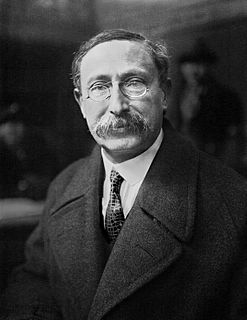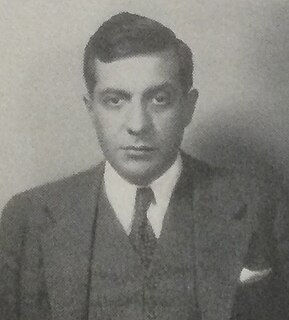
André Léon Blum was a French socialist politician and three-time Prime Minister of France.

Édouard Daladier was a French Radical-Socialist politician and the Prime Minister of France at the outbreak of World War II.

Gualberto Villarroel López was the head of state of Bolivia from December 20, 1943 to July 21, 1946. A reformist, sometimes compared with Argentina's Juan Domingo Perón, he is nonetheless remembered for his alleged fascist sympathies and for his violent demise on July 21, 1946.

Vito Anthony Marcantonio was an Italian-American lawyer and leftist politician. Originally a member of the Republican Party and a supporter of Fiorello LaGuardia, he switched to the American Labor Party. Later in his life, Marcantonio grew more to the far left of the American political spectrum, and was nationally known for his support from Communists in the 1940s.

General Carlos Quintanilla Quiroga served as the de facto President of Bolivia from August 1939 until April 1940. Quintanilla saw action during the Chaco War of 1932–1935, and managed to ascend the echelon of the Bolivian armed forces until he became Commander of the Army during the administration of Germán Busch. When President Busch committed suicide on August 23, 1939, the Bolivian military entrusted Quintanilla with the role of assuming power and calling elections.
The Socialist Republican Party, whose members were also known as "Saavedristas", was a political party in Bolivia. The Socialist Republican Party emerged on January 28, 1921, as the Republican Party was bifurcated on the same day Bautista Saavedra took office as President of the country. The Socialist Republican Party was formed by Saavedra's followers.
The Genuine Republican Party was founded in Bolivia in 1921 by José María Escalier and Daniel Domingo Salamanca Urey following a split in the Republican Party.
The Nationalist Party was a Bolivian reformist and nationalist political party.
The United Socialist Party was founded on 15 March 1936, as the result of a split in the Nationalist Party in 1936 and the adhesion of some prominent members of the Republican Socialist Party in 1937, and backed by Legion of Veterans and by the regional socialist groups.
The Independent Socialist Party was founded in March 1938 by Víctor Paz Estenssoro, Carlos Salamanca, Jorge Aráoz Campero, Carlos Montenegro and Augusto Céspedes, following a split in the United Socialist Party.
The Popular Front of Potosí was a powerful local left-wing-socialist political party in Potosí.
The Trade Union Confederation of Bolivian Workers was the largest and most prominent trade union confederation in Bolivia from 1936 to 1952.
The Workers Socialist Party of Bolivia was a Trotskyist political party in Bolivia.
The Antifascist Democratic Front was a political alliance of the traditionalist and left-wing parties in Bolivia.
The Bolivian National Convention of 1938 was an elected constituent assembly held from May 23 to October 30, and charged with rewriting the constitution of Bolivia. President David Toro called for the National Convention in 1937, but had been replaced by Germán Busch by the time it was held. Voter rolls for electing Convention members were opened in August 1937, and the vote was held in March 1938.
The history of the Jews in Bolivia stretches from the colonial period of Bolivia in the 16th century to the end of the 19th century. In the 19th century, Jewish merchants came to Bolivia, most of them taking local women as wives and founding families that merged into the mainstream Catholic society. This was often the case in the eastern regions of Santa Cruz, Tarija, Beni and Pando, where these merchants came either from Brazil or Argentina.






